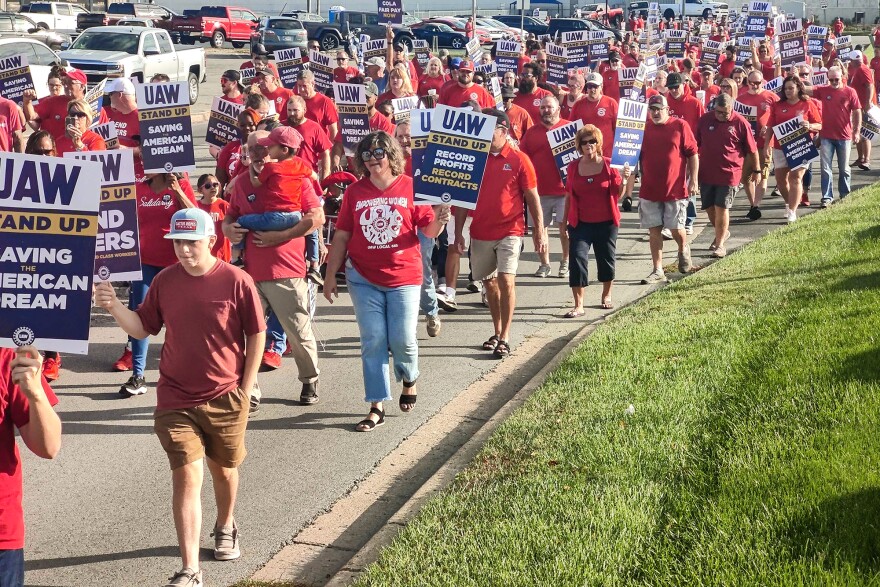The United Auto Workers strike strategy has been mostly predictable over the last four weeks. On Fridays, the union would announce which plants would go on strike based on how well the week's negotiations went. National union leadership announced Friday that pattern is ending — and local UAW officials say they'll have to calm members' nerves about it.
The union aims to push General Motors, Ford and Stellatis to concede more and do it faster. So now, any plant could strike at any time with little warning.
“They stopped being interested in reaching a fair deal now and only became interested in gaming our system of announcing strike expansions on Friday,” said UAW President Shawn Fain in a Facebook livestream announcing the changed strategy Friday morning. “They thought they figured out the so-called rules of the game. So we changed the rules.”
The union demonstrated this new “phase” of the strike strategy on Wednesday by suddenly calling workers to strike at a major Ford plant in Louisville, Kentucky.
“We did it the way we did for a simple reason. The company started to wait till Friday to make substantial progress in bargaining,” Fain said. “We've been teaching them how to bargain with the threat of a strike. We can get them moving. We can teach them the real meaning of competition. Not a race to the bottom, but a race to avoid further strikes.”
Holli Murphy represents workers at GM’s Fort Wayne Assembly plant as president of UAW Local 2209.
“As leadership, we do hope we get a heads up that we’re going out so we can get everybody prepared. We’re prepared here as a local, but just to calm the nerves and chaos,” Murphy said. “Because there will be mass chaos.”
Local 2209’s Shop Chairman Rich LeTourneau said he was out on the assembly plant floor during Friday morning’s announcement, which began about 30 minutes late because Fain said he was in talks with Stellantis.
“It was 10 after [10 a.m.] when I was still out there and everybody was looking at their phones, trying to do their job at the same time, which is difficult,” he said. “I don't think they were really happy with that because it was a half hour late from when he was supposed to be doing it. And … [Facebook Live is] the only way they can get the message and they're anticipating something sooner or later for Fort Wayne Assembly.”
LeTourneau said he also worries that one of the companies might say negotiations are at an “impasse” if progress continues to be slow and the strikes expand.
“A lot of things can happen. They can bring in replacement workers. They can implement the 'last, best and final,'” he said. “If somebody declares impasse, and both sides recognize we're at impasse, they can activate the last, best and final and just start moving forward with the last offer they made, which we do not want that to happen.”
Derek Cronin is president of UAW Local 440, which represents GM workers at a casting plant in Bedford.
“My phone is always on. The times of kind of getting those six or seven hours at night where I shut my phone off … it's not happening anymore,” Cronin said. “It can still happen at any point. We just got used to Friday announcements. So I don't think it's a big switch for people. We've kind of been at the ready at any point in time.”
Cronin said he does think the strategy has created some anxiety for his members as well.
“But at the same time, I think … we've been seeing the fruits of this strategy. Like General Motors getting the battery plants under our master agreements. That was huge. I can't tell you like how excited people were to hear that,” he said. Was that something we could have done using the old strategy? Maybe, maybe not. But I think people have appreciated the fact that this new strategy is getting us to places that we haven't been for 15 years, maybe didn't think we could get to.”
Join the conversation and sign up for the Indiana Two-Way. Text "Indiana" to 73224. Your comments and questions in response to our weekly text help us find the answers you need on statewide issues.
Cronin added he thinks members are eager to see some more “tangible” results of the strategy in contract language.
“Like with the battery plants. It's good that we got them under our agreement, but there are so many things attached to that that people have questions on,” he said. “Like we have a number of displaced people from the plant in Lordstown, [Ohio] that closed. There's a battery plant there. So what is the language going to say on battery plants for those people if they want to go back? Is there going to be transfer rights? Is the wage scale going to be the same? Are the benefits going to be the same?”
Cronin said he is confident national leaders will avoid creating a different wage scale or other “tier” of workers at the battery plants.
“I think the big question for everybody is: what is it going to take for us to get to that point?” he said.
Adam is IPB's labor and employment reporter. Contact him at arayes@wvpe.org or follow him on Twitter at @arayesIPB.
Copyright 2023 IPB News.





